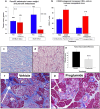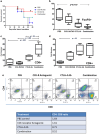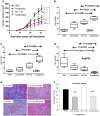Cholecystokinin receptor antagonist alters pancreatic cancer microenvironment and increases efficacy of immune checkpoint antibody therapy in mice
- PMID: 29043413
- PMCID: PMC5801048
- DOI: 10.1007/s00262-017-2077-9
Cholecystokinin receptor antagonist alters pancreatic cancer microenvironment and increases efficacy of immune checkpoint antibody therapy in mice
Abstract
Advanced pancreatic ductal adenocarcinoma (PDAC) has typically been resistant to chemotherapy and immunotherapy; therefore, novel strategies are needed to enhance therapeutic response. Cholecystokinin (CCK) has been shown to stimulate growth of pancreatic cancer. CCK receptors (CCKRs) are present on pancreatic cancer cells, fibroblasts, and lymphocytes. We hypothesized that CCKR blockade would improve response to immune checkpoint antibodies by promoting influx of tumor-infiltrating lymphocytes (TILs) and reducing fibrosis. We examined the effects of CCKR antagonists or immune checkpoint blockade antibodies alone or in combination in murine models of PDAC. Monotherapy with CCKR blockade significantly decreased tumor size and metastases in SCID mice with orthotopic PDAC, and in C57BL/6 mice, it reduced fibrosis and induced the influx of TILs. Immune-competent mice bearing syngeneic pancreatic cancer (Panc02 and mT3-2D) that were treated with the combination of CCK receptor antagonists and immune checkpoint blockade antibodies survived significantly longer with smaller tumors. Tumor immunohistochemical staining and flow cytometry demonstrated that the tumors of mice treated with the combination regimen had a significant reduction in Foxp3+ T-regulatory cells and an increase in CD4+ and CD8+ lymphocytes. Masson's trichrome stain analysis revealed 50% less fibrosis in the tumors of mice treated with CCKR antagonist compared to controls and compared to checkpoint antibody therapy. CCKR antagonists given with immune checkpoint antibody therapy represent a novel approach for improving survival of PDAC. The mechanism by which this combination therapy improves the survival of PDAC may be related to the decreased fibrosis and immune cells of the tumor microenvironment.
Keywords: Cholecystokinin; Fibrosis; Tumor microenvironment; Tumor-infiltrating lymphocytes.
Conflict of interest statement
The authors declare that they have no conflict of interest.
Figures




Similar articles
-
Single-cell RNA sequencing reveals compartmental remodeling of tumor-infiltrating immune cells induced by anti-CD47 targeting in pancreatic cancer.J Hematol Oncol. 2019 Nov 27;12(1):124. doi: 10.1186/s13045-019-0822-6. J Hematol Oncol. 2019. PMID: 31771616 Free PMC article.
-
IL-6 and PD-L1 antibody blockade combination therapy reduces tumour progression in murine models of pancreatic cancer.Gut. 2018 Feb;67(2):320-332. doi: 10.1136/gutjnl-2016-311585. Epub 2016 Oct 21. Gut. 2018. PMID: 27797936 Free PMC article.
-
CD25 and TGF-β blockade based on predictive integrated immune ratio inhibits tumor growth in pancreatic cancer.J Transl Med. 2018 Oct 25;16(1):294. doi: 10.1186/s12967-018-1673-6. J Transl Med. 2018. PMID: 30359281 Free PMC article.
-
Tumor immune microenvironment in pancreatic ductal adenocarcinoma revisited - Exploring the "Space".Cancer Lett. 2025 Jul 10;622:217699. doi: 10.1016/j.canlet.2025.217699. Epub 2025 Apr 7. Cancer Lett. 2025. PMID: 40204149 Review.
-
Current advances and outlooks in immunotherapy for pancreatic ductal adenocarcinoma.Mol Cancer. 2020 Feb 15;19(1):32. doi: 10.1186/s12943-020-01151-3. Mol Cancer. 2020. PMID: 32061257 Free PMC article. Review.
Cited by
-
Combination systemic therapies with immune checkpoint inhibitors in pancreatic cancer: overcoming resistance to single-agent checkpoint blockade.Clin Transl Med. 2018 Oct 8;7(1):32. doi: 10.1186/s40169-018-0210-9. Clin Transl Med. 2018. PMID: 30294755 Free PMC article. Review.
-
CCK Receptor Inhibition Reduces Pancreatic Tumor Fibrosis and Promotes Nanoparticle Delivery.Biomedicines. 2024 May 7;12(5):1024. doi: 10.3390/biomedicines12051024. Biomedicines. 2024. PMID: 38790986 Free PMC article.
-
Cuproptosis-related lncRNA scoring system to predict the clinical outcome and immune landscape in pancreatic adenocarcinoma.Sci Rep. 2023 Nov 27;13(1):20870. doi: 10.1038/s41598-023-47223-4. Sci Rep. 2023. PMID: 38012210 Free PMC article.
-
Gastrin vaccine improves response to immune checkpoint antibody in murine pancreatic cancer by altering the tumor microenvironment.Cancer Immunol Immunother. 2019 Oct;68(10):1635-1648. doi: 10.1007/s00262-019-02398-6. Epub 2019 Sep 24. Cancer Immunol Immunother. 2019. PMID: 31549214 Free PMC article.
-
Genomics meets immunity in pancreatic cancer: Current research and future directions for pancreatic adenocarcinoma immunotherapy.Oncol Rev. 2019 Aug 1;13(2):430. doi: 10.4081/oncol.2019.430. eCollection 2019 Jul 22. Oncol Rev. 2019. PMID: 31456872 Free PMC article.
References
-
- Smith JP, Fantaskey AP, Liu G, Zagon IS. Identification of gastrin as a growth peptide in human pancreatic cancer. Am J Physiol. 1995;268:R135–R141. - PubMed
Publication types
MeSH terms
Substances
Grants and funding
LinkOut - more resources
Full Text Sources
Other Literature Sources
Medical
Research Materials

